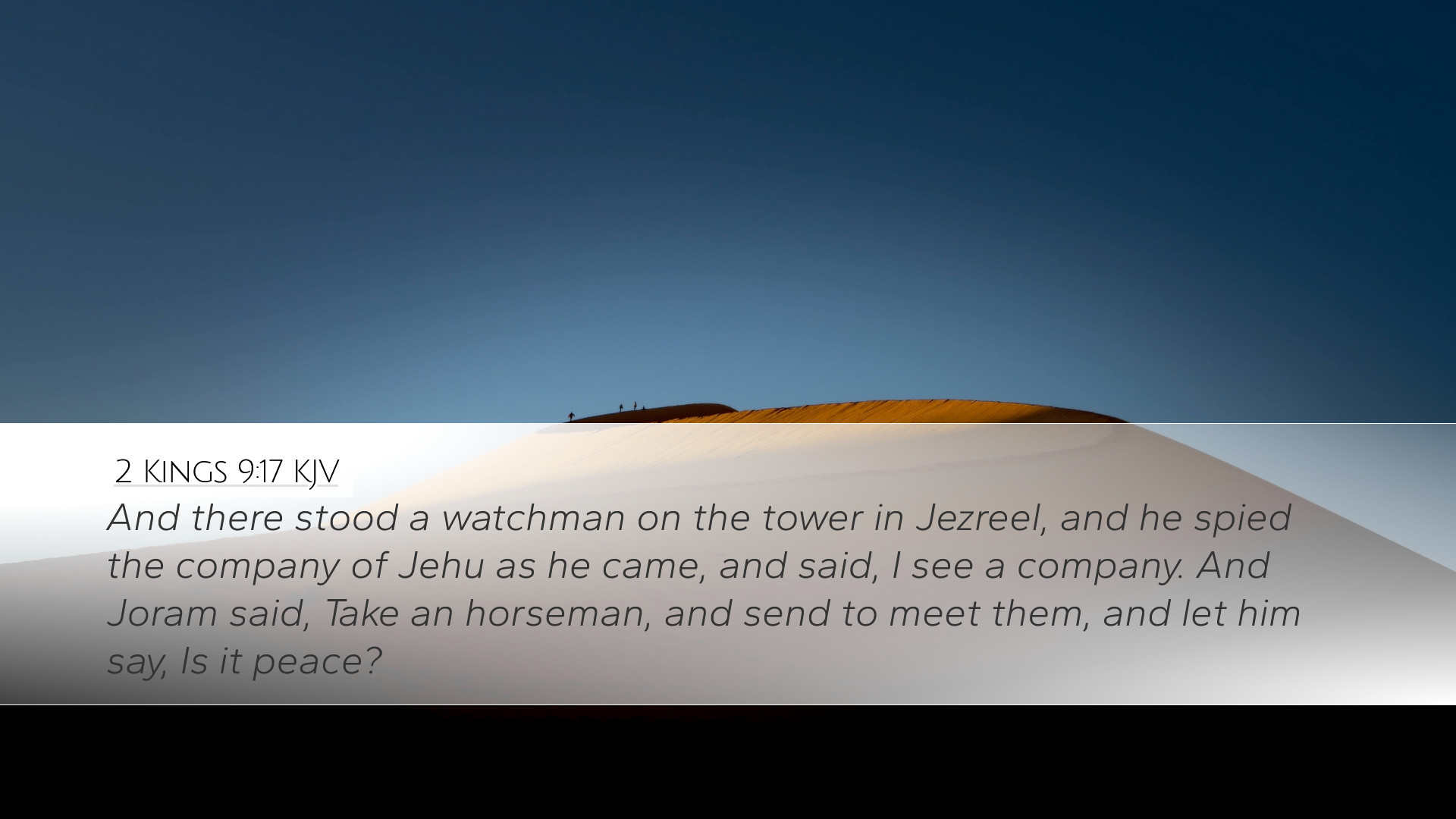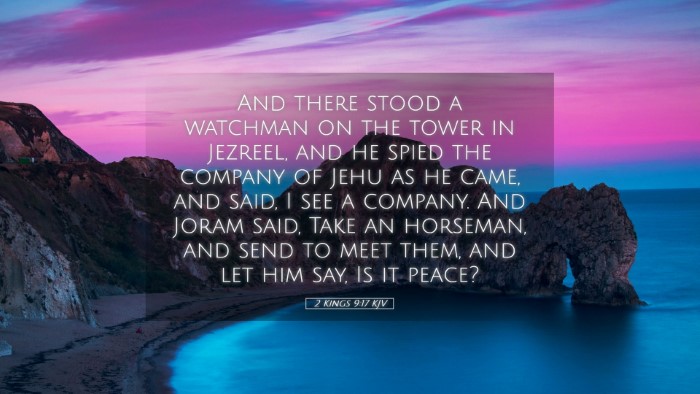Commentary on 2 Kings 9:17
Verse Context: 2 Kings 9:17 states, "And there stood a watchman on the tower in Jezreel, and he spied the company of Jehu as he came, and said, I see a company." This verse sets the tone for a significant transition in leadership and a pivotal moment in Israel's history.
Summary of Insights
This commentary will explore the varying perspectives from notable public domain theologians including Matthew Henry, Albert Barnes, and Adam Clarke, focusing on their interpretations and applications of this verse for contemporary readers.
1. Historical Context
Matthew Henry emphasizes the importance of the historical backdrop of this verse. He notes that this moment occurs in a time of divine judgment upon the house of Ahab, a house marked by idolatry and moral decay. The watchman is portrayed as a sentinel, tasked with observing the movements of those approaching, which symbolizes a broader theme of vigilance and awareness in the spiritual realm.
Albert Barnes adds that the city of Jezreel signifies more than just a geographical location; it represents the hub of Ahab's influence and corruption. The watchman's observation is a foreshadowing of the change that is about to occur, highlighting the tension between the current reign and the impending shift to Jehu, who was prophesied to destroy the house of Ahab.
2. The Role of the Watchman
The figure of the watchman is crucial in this narrative. Adam Clarke illuminates the responsibilities of such a person in ancient cities, where watchmen were essential for warning of danger and bringing news. The watchman’s role in this scripture serves as a metaphor for spiritual vigilance; it implores believers to be alert to the movements of both good and evil.
- Vigilance Required: Clarke points out that just as the watchman was expected to be observant, so too must believers be watchful for the signs of God's work in their lives.
- Spiritual Discernment: The ability to discern who is coming and the intent of their coming (whether salvation or judgment) is crucial for a faithful believer.
3. The Coming of Jehu
The mention of Jehu is significant and forms a critical pivot in this text. Matthew Henry notes that Jehu's coming is not just a historical event but also serves as a divine intervention. It shows how God orchestrates history and uses particular individuals to execute His justice against sin.
Albert Barnes emphasizes the prophetic nature of Jehu's anointing, highlighting that this moment was foretold and indicates the fulfillment of God's promises regarding judgment upon Ahab's house. Jehu represents both God's wrath and His plan for restoration through judgment.
4. Symbolism and Thematic Elements
This verse also contains rich symbolism and thematic elements. Adam Clarke points to the idea of the "watchman" as a symbol of the prophetic voice that speaks to the people regarding what is to come.
- The Watchman as a Prophet: The watchman’s sight can be paralleled to the prophetic call in the church today, urging leaders and congregations to be aware of spiritual threats and God's movements.
- Warning and Awareness: This narrative emphasizes the need for church leadership to be alert to both the needs of the congregation and the signs of the times.
5. Practical Applications for Today
This passage offers several practical applications for pastors, students, theologians, and Bible scholars:
- Spiritual Vigilance: Like the watchman, believers are called to be vigilant, discerning both the culture around them and the whispers of the Holy Spirit.
- Preparation for Change: The church must be prepared for the changes God may bring. Just as Jehu’s coming indicates a shift, so too must churches be ready to embrace or confront the changes God brings.
- Leadership and Prophetic Voice: Just as the watchman had a role to play in notifying the city of impending change, leaders today must be equipped to speak prophetically to their communities.
Conclusion
In conclusion, 2 Kings 9:17 serves as a poignant reminder of the importance of vigilance in spiritual matters, the readiness for divine intervention, and the fulfillment of God's promises. Through the lens of public domain commentaries, it becomes clear that the roles of observers, like watchmen, along with the leadership qualities exemplified by figures like Jehu, symbolize the ongoing narrative of God’s sovereignty in history and His call for readiness in the hearts of believers.


